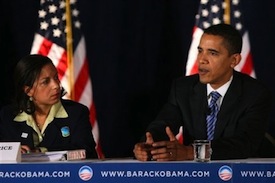US UNSC Draft Resolution Calls for Nuclear Disarmament
September 14, 2009
Featured Image
Stories we're following today:
Obama’s UN Nonproliferation Resolution: The Text – Laura Rozen in Politico [link]
- When Barack Obama makes his debut appearance at the United Nations next week, and becomes the first president of the United States to preside over a United Nations Security Council meeting September 24th, the centerpiece of his administration’s efforts to set a new tone of international partnership at the forum will be his administration’s nuclear disarmament proposal.
- Washington nonproliferation experts describe the draft U.S. UN resolution as important, including in signaling the Obama administration’s return to international non-proliferation goals that the Bush administration had walked back from.
- “This resolution is a solid piece of work, the best one could expect from the UN resolution process,” said Joseph Cirincione, president of the Plougshares Fund, which advocates nonproliferation goals. “It’s significant in several aspects,” he added, naming in particular the draft’s reaffirming a pledge that nuclear states would not use nuclear weapons against non-nuclear states – a U.S. position up until the Bush administration, he said.
October Talks Scheduled on Iran’s Nuclear Program – Los Angeles Times [link]
- Iranian officials will meet with the United States, Europe, Russia and China to discuss Iran's nuclear program on Oct. 1, the spokeswoman for the European Union's foreign policy chief told The Times.
- The scheduled meeting follows Iran's submission last week of a five-page proposal that offered wide-ranging talks but did not mention the West's main concern: Iran's continued production of enriched uranium in violation of five U.N. Security Council resolutions.
- Note: See ArmsControlWonk for an analysis of why there may be more overlap between Iran’s current negotiating proposal and the West’s proposal, which was submitted to Iran in June 2008, than there seems at first glance.
A Hundred Holocausts: An Insider’s Window Into U.S. Nuclear Policy – Daniel Ellsberg in Truthdig [link]
- The “option” of massive attacks on cities (or, euphemistically, upon industrial and military targets within or near cities) almost surely remains one among many planned alternatives, ready as ever to be carried out, within the strategic repertoire of U.S. and Russian plans and force readiness: this, a quarter-century after the discovery of the nuclear winter phenomenon.
- Presidents Barack Obama and Dmitry Medvedev have agreed to lower the operational warheads to between 1,500 and 1,675 by the year 2012. But the explosion of 1,000 warheads together by the U.S. and Russia could trigger a full-scale nuclear winter. And recent studies show the possibility of ecological catastrophe from smoke effects on the ozone layer after a very much smaller exchange, such as could occur between India and Pakistan.
- Our representatives in Congress should—for the first time—take on responsibility for learning about and influencing the possible human and environmental consequences of carrying out our operational nuclear war plans.
The Mushroom Clouds on the Horizon: The Comprehensive Test Ban Treaty – Daily Kos [link]
- Plutonium Page: Last week, I spoke with [Arms Control Association Executive Director Daryl] Kimball about the [Comprehensive Test Ban Treaty] CTBT, which Obama hopes to ratify by April 2010. I was curious about what obstacles Obama might face from the Senate, specifically if proponents of a new generation of nuclear warheads (the Reliable Replacement Warhead, or RRW) would try to tie that in with CTBT ratification.
- “I think what will definitely happen is in the test ban treaty discussion the skeptics of the test ban [such as Jon Kyl, R-AZ] will insist upon modernizing the nuclear weapons design and production infrastructure, and they will suggest that we modernize our existing warheads to make them effective well into the future,” Kimball said.
- But, according to Kimball: “The main argument that we're making - the administration is now making - is that it's time to reconsider the CTBT because the concerns that some senators had in 1999 when the Senate voted "no", October 13, 1999, an anniversary that's coming up soon, have largely been addressed. We now have a proven track record of work by the weapons labs of maintaining the existing warheads. ”
A View from the Dark Side
Regime Change is Dead. Long Live Regime Change. - John Hannah in Foreign Policy [link]
- The fact is that a central, but unspoken element of President Obama's strategy for securing a deal -- his readiness to acknowledge the legitimacy and permanency of the Iranian regime -- has been severely undercut by Iran's post-election turmoil.
- It is ironic, of course, that just as the Obama administration seemed prepared to write off regime change forever, the Iranian people have made it a distinct possibility. It would be tragic indeed if the United States took steps to bolster the staying power of Iran's dictatorship at precisely the moment when so many Iranians appear prepared to risk everything to be rid of it.



